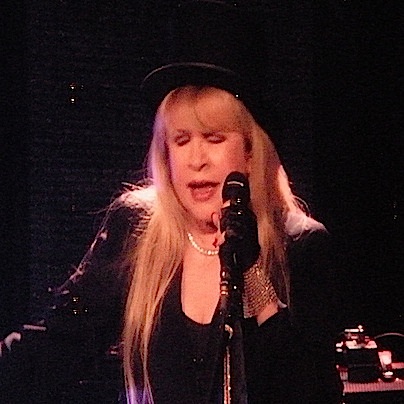Arts & Entertainment
Magical music nights
Great concert week in DC with the Mac, Mika and Cameron Carpenter

It was a great week for live music in Washington — Fleetwood Mac brought its “Tour 2013” to the Verizon Center Tuesday night, out pop singer Mika brought his acoustic show to the Sixth & I Synagogue Wednesday night and on Friday, queer organist Cameron Carpenter made his Washington-area debut at the Strathmore in Bethesda. The proceedings were stellar all around — I’ll dissect chronologically.
Many, many years of following various pop and rock acts has brought me to the realization that so many acts sort of “train” their audiences what to expect and the Mac is a perfect example. Its members — namesake rhythm section Mick Fleetwood and John McVie along with singer/songwriters Stevie Nicks and Lindsey Buckingham — talk in interviews as if they’re dutifully restricted from mixing things up too much because even with longtime songstress Christine McVie long gone (only one of her songs was performed — the chestnut “Don’t Stop”), they still have a truckload of ground they feel obligated to cover with songs like “Second Hand News,” “The Chain,” “Dreams,” “Rhiannon,” “Go Your Own Way” and the list goes on and on.
Thankfully the Mac — touring a second consecutive time now without a new album out — is throwing in a few surprises. Nicks has revived the long-dormant “Tusk” track “Sisters of the Moon” for the first time since the “Mirage Tour” in the early ’80s. There’s also one all-new track (“Sad Angel”) Buckingham says is slated for an imminent EP and the ancient-but-never-released song “Without You,” a ballad that featured perhaps the loveliest Buckingham/Nicks harmonies of the evening.
Except for some very anti-Mac-like remix-type looping touches brought into “World Turning,” the arrangements were tried and true. Nobody could argue the Mac doesn’t know how to give the masses what they want. Which can be a little disappointing for the die hards who go hear them every time they tour. Or even the more casual fans who tend to be more musically adventurous. Though many of the suggestions thrown about are utterly absurd — Thomas Conner’s naive op-ed in the Chicago Sun-Times last week is a great example — I could have gone for maybe 10 percent more adventure. A good starting point would have been “Soldier’s Angel,” the haunting duet Buckingham joined Nicks on for her brilliant 2011 album “In Your Dreams.”
With some acts — Madonna for one — you know you’re not going to hear every hit every tour. The Mac has never been like this, yet a few more unexpected moments would keep them a notch or two further away from the “cashing in/gravy train” bandwagon they’re clearly on. If you think for a second this is about the music and not the money, recall the arm twisting it took to get Nicks to agree to this. There was a well-publicized ballyhoo in 2012 when Fleetwood whined in a Playboy interview that he doubted the Mac would ever tour again when Nicks insisted on giving her solo album another year of touring. It was so wildly overstated that here they are on tour the very next year. (Nicks said later three years — and she’s right — feels like a good amount of time to go between Mac tours.)
While the band has been more about money than music for eons, I will say a few quick things: one, the music at Tuesday night’s show was scary good. Nicks, though she doesn’t scream and growl as she used to, has developed into a very solid singer. There wasn’t one off-pitch sound that came from her mouth the whole night. And Buckingham’s guitar work was as great as it has ever been. If there’s one upside to the lack of Mac recordings in the last 10 years or so, it’s that Buckingham’s solo career has soared off in the other direction with a trio of masterfully conceived and executed solo albums (2006’s “Under the Skin,” 2008’s “Gift of Screws” and 2011’s “Seeds We Sow”).
Given the way the Internet has decimated album sales — especially new work from veteran acts — one can hardly argue with their “let’s just tour” approach. Still nobody seemed to notice the irony of the situation when Buckingham spoke about not wanting to run something that worked (“Rumours”) into the ground when it came time to make “Tusk.” Sadly now the band is doing almost exactly that — touring clearly works (I’ve never seen the Verizon Center so packed and on a weeknight no less) so why be bothered with doing a new album? While the night was great fun, the reality that the Mac seems highly uninterested in doing much beyond trudging out the staples — Nicks is the chief foot dragger — lent the proceedings a bittersweet air.
And why can’t we all just agree to let Christine McVie do what she wants? Legions of the Mac faithful seem to be holding out hope that she’ll one day rejoin them for one last outing. While yeah, that would be cool for “old time’s sake” (McVie said recently she would consider joining them on stage in London if they ask her later this year), they’ve already done that. Why do we need another “The Dance”-type outing (the name of a ’97 reunion tour with the classic lineup), especially if McVie’s heart is not in it? I would feel differently if they’d never done “The Dance,” but since they have, it’s time for everybody to move on.
Mika’s show the next night was an interesting study in contrasts — from a veteran band reliving its glory days to a young singer (he’s 29) only on his third album playing a small, atmosphere-heavy synagogue (it’s actually a great concert spot — much more music-friendly than the much-lauded 9:30 Club) with a throng of young fans at fever-pitch excitement throughout the evening. Touring behind his near-masterpiece album of last fall “Origin of Love,” the obscenely talented popster poured his passionately creamy falsetto-hued vocals and drivingly percussive piano playing through a nearly two-hour set that was the furthest thing from phoned in you could imagine.
Working with a tight two-man band — players who seemed to grab any instrument of the dozens on stage they could quickly get their hands on — Mika radically reinvented several songs from their studio versions (a ballad version of dance cut “Stardust” from the new album was perhaps the most radical), led several all-out audience sing-alongs (and the crowd knew every word) on “Grace Kelly,” “Love Today” and “Celebrate” among others, and even stepped away from the mic for nearly two full numbers just to savor the acoustics — which are stellar — of the venue. All were show-stopping in the best way.
Mika truly has it all — killer voice, great songwriter, solid musical chops and just-left-enough-of-center looks and charm to never be mistaken for a “Bachelor” contestant. He’s sort of our queer Justin Timberlake — with a much better current album out too, by the way.
Switching gears radically was Cameron Carpenter’s organ recital Friday night which, despite a few logistical head scratchers (more on that in a sec), was a musical accomplishment of Herculean, truly other-worldly proportions. Watching and hearing him play is much akin to the scene in the classic “Outer Limits” episode (“The Sixth Finger”) in which a scientist figures out a way to push evolution ahead a million years and suddenly the protagonist can play Bach he just picked up. Carpenter is almost in that league, having been something of a child prodigy who claims to have mastered “The Well-Tempered Clavier” in adolescence.
The first oddity was why Carpenter — with all the amazing pipe organs in Washington — was at the organ-less Strathmore at all. Playing an electronic Rodgers three manual brought in just for the occasion, Carpenter got more sonic contrast out of the thing than probably anybody else could have, but from the massive instrument at the National Cathedral, the new pipe organ at the Kennedy Center (where he’s rumored to be playing next year sometime) or even the glorious five-manual behemoth at National City Christian Church in Thomas Circle (which could just about have housed the somewhat disappointing turnout — of the Strathmore’s three balconies, only the lowest one was about half-full; the upper two sat empty), it seemed just plain dumb to have him there. It could be a harbinger of things to come — Carpenter’s most insistent recurring theme is his endless frustration at having to adapt to a different organ for each town he plays. Let’s hope whatever touring instrument he ends up with — he says it’s almost finished — has a little more sonic heft than the Rodgers. Which sounded OK — I’m not trashing it altogether. One could clearly tell, though, that it was a sound coming from speakers, not pipes.
That said, what Carpenter did with it was beyond staggering. His musical instincts — as sharp and deadly as Wolverine’s knife claws — are in a league of their own among organists, at least to my knowledge. He plays with a pianistic-like virtuosity that’s stunning to watch (a screen above him amplified his finger work). Often playing two manuals simultaneously with one hand, leap-frogging between the choir, great and swell like an Olympic sprinter and displaying the most nimble pedal work I’ve ever seen, Carpenter truly is a talent for the ages. Granted, the Rodgers had a minimal number of stops it appeared — it looked like a child’s toy compared to, say, the National City console — yet Carpenter changed registrations like most people blink. One five-minute improvisation he played featured more than 40 registration changes. That amount of tone painting just through stop changes was impressive in and of itself, forget about the actual note playing.
His wildly eclectic 100-odd minute show (played entirely from memory) featured everything from Bach works written for organ, transcribed for piano, then adapted back to organ (by Carpenter), two Liszt Transcendental Etudes he said were “nearly impossible to play,” a wickedly playful transcription of Bernstein’s “Candide” Overture and a playful encore/fantasia on — of all things — “Shortnin’ Bread,” a whimsical-but-no-less-dramatic way to end the evening. The highlights for me were a moody and languid — yet endlessly colorful — transcription of Isaac Albeniz’s piano work “Evocacion” (the first movement from “Iberia”) and a fantastically creative Marcel Dupre arrangement of a French Noel that Carpenter tackled in a deliciously subversive way, nearly matching the macabre wit Dupre brought to it originally.
Though nearly as night and day as one could fathom, all three shows were utterly magical and evenings I will never forget.
Fleetwood Mac’s set:
1. Second Hand News
2. The Chain
3. Dreams
4. Sad Angel
5. Rhiannon
6. Not That Funny
7. Tusk
8. Sisters of the Moon
9. Sara
10. Big Love
11. Landslide
12. Never Going Back Again
13. Without You
14. Gypsy
15. Eyes of the World
16. Gold Dust
17. So Afraid
18. Stand Back
19. Go Your Own Way
ENCORE
20. World Turning
21. Don’t Stop
ENCORE 2
22. Silver Springs
23. Say Goodbye
Mika’s set:
1. Grace Kelly
2. Toy Boy
3. Lollipop
4. Blue Eyes
5. Billy Brown
6. Popular
7. Love You When I’m Drunk
8. Underwater
9. Stuck in the Middle
10. Emily
11. Big Girls
12. Origin of Love
13. Happy Ending
14. Lola
15. Relax, Take it Easy
16. Stardust
17. Celebrate
18. Love Today
19. Over My Shoulder
Cameron Carpenter’s set:
1. Bach — Prelude 1 from “Well Tempered Clavier”/Fugue No. 15 in G Major
2. Bach/Busoni — Cello Suite No. 1
3. Bach — Fantasia and Fugue in G Minor
4. Albeniz — Evocacion from Iberia
5. Dupre — Variations on a Noel
6. Liszt — Feux Follets
7. Liszt — La Campanella
INTERMISSION
8. Bernstein — Candide Overture
9. Ives — The Alcotts from Concord Sonata
10. Improv
11. Improv
ENCORE
12. Chopin — Minute Waltz
13. Shortnin’ Bread

The fifth annual Fredericksburg Pride march and festival was held on Saturday, June 28. A march through the streets of downtown Fredericksburg, Va. was followed by a festival at Riverfront Park.
(Washington Blade photos by Michael Key)



















India
Anaya Bangar challenges ban on trans women in female cricket teams
Former Indian cricketer Sanjay Bangar’s daughter has received support

Anaya Bangar, the daughter of former Indian cricketer Sanjay Bangar, has partnered with the Manchester Metropolitan University Institute of Sport in the U.K. to assess her physiological profile following her gender-affirming surgery and undergoing hormone replacement therapy.
From January to March 2025, the 23-year-old underwent an eight-week research project that measured her glucose levels, oxygen uptake, muscle mass, strength, and endurance after extensive training.
The results, shared via Instagram, revealed her metrics align with those of cisgender female athletes, positioning her as eligible for women’s cricket under current scientific standards. Bangar’s findings challenge the International Cricket Council’s 2023 ban on transgender athletes in women’s cricket, prompting her to call for a science-based dialogue with the Board of Control for Cricket in India and the ICC to reform policies for transgender inclusion.
“I am talking with scientific evidence in my hand,” Bangar said in an interview posted to her Instagram page. “So, I hope, this makes an impact and I will be hoping to BCCI and ICC talking with me and discussing this further.”
On Nov. 21, 2023, the ICC enacted a controversial policy barring trans women from international women’s cricket. Finalized after a board meeting in Ahmedabad, India, the regulation prohibits any trans player who has experienced male puberty from competing, irrespective of gender-affirming surgery or hormone therapy. Developed through a 9-month consultation led by the ICC’s Medical Advisory Committee, the rule aims to safeguard the “integrity, safety, and fairness” of women’s cricket but has drawn criticism for excluding athletes like Canada’s Danielle McGahey, the first trans woman to play internationally. The policy, which allows domestic boards to set their own rules, is slated for review by November 2025.
Bangar shared a document on social media verifying her participation in a physiological study at the Manchester Metropolitan University Institute of Sport, conducted from Jan. 20 to March 3, 2025, focused on cricket performance. The report confirmed that her vital metrics — including haemoglobin, blood glucose, peak power, and mean power — aligned with those of cisgender female athletes. Initially, her fasting blood glucose measured 6.1 mmol/L, slightly above the typical non-diabetic range of 4.0–5.9 mmol/L, but subsequent tests showed it normalized, reinforcing the study’s findings that her physical profile meets female athletic standards.
“I am submitting this to the BCCI and ICC, with full transparency and hope,” said Bangar. “My only intention is to start a conversation based on facts not fear. To build space, not divide it.”
In a letter to the BCCI and the ICC, Bangar emphasized her test results from the Manchester Metropolitan University study. She explained that the research aimed to assess how hormone therapy had influenced her strength, stamina, haemoglobin, glucose levels, and overall performance, benchmarked directly against cisgender female athletic standards.
Bangar’s letter to the BCCI and the ICC clarified the Manchester study was not intended as a political statement but as a catalyst for a science-driven dialogue on fairness and inclusion in cricket. She emphasized the importance of prioritizing empirical data over assumptions to shape equitable policies for trans athletes in the sport.
Bangar urged the BCCI, the world’s most influential cricket authority, to initiate a formal dialogue on trans women’s inclusion in women’s cricket, rooted in medical science, performance metrics, and ethical fairness. She called for the exploration of eligibility pathways based on sport-specific criteria, such as haemoglobin thresholds, testosterone suppression timelines, and standardized performance testing. Additionally, she advocated for collaboration with experts, athletes, and legal advisors to develop policies that balance inclusivity with competitive integrity.
“I am releasing my report and story publicly not for sympathy, but for truth. Because inclusion does not mean ignoring fairness, it means measuring it, transparently and responsibly,” said Bangar in a letter to the BCCI. “I would deeply appreciate the opportunity to meet with you or a representative of the BCCI or ICC to present my findings, discuss possible policy pathways, and work towards a future where every athlete is evaluated based on real data, not outdated perceptions.”
Before her transition, Bangar competed for Islam Gymkhana in Mumbai and Hinckley Cricket Club in the U.K., showcasing her talent in domestic cricket circuits. Her father, Sanjay Bangar, was a dependable all-rounder for the Indian national cricket team from 2001 to 2004, playing 12 test matches and 15 One Day Internationals. He later served as a batting coach for the Indian team from 2014 to 2019, contributing to its strategic development.
Cricket in India is a cultural phenomenon, commanding a fanbase of more than 1 billion, with more than 80 percent of global cricket viewership originating from the country.
The International Cricket Council, the sport’s governing body, oversees 12 full member nations and more than 90 associate members, with the U.S. recently gaining associate member status in 2019 and co-hosting the 2024 ICC Men’s T20 World Cup. The BCCI generated approximately $2.25 billion in revenue in the 2023–24 financial year, primarily from the Indian Premier League, bilateral series, and ICC revenue sharing. The ICC earns over $3 billion from media rights in India alone for the 2024–27 cycle, contributing nearly 90 percent of its global media rights revenue, with the BCCI receiving 38.5 percent of the ICC’s annual earnings, approximately $231 million per year.
Women’s cricket in India enjoys a growing fanbase, with over 300 million viewers for the Women’s Premier League in 2024, making it a significant driver of the sport’s global popularity. The International Cricket Council oversees women’s cricket in 12 full member nations and over 90 associate members, with the U.S. fielding a women’s team since gaining associate status in 2019 and competing in ICC events like the 2024 Women’s T20 World Cup qualifiers. The BCCI invests heavily in women’s cricket, allocating approximately $60 million annually to the WPL and domestic programs in 2024–25, while contributing to the ICC’s $20 million budget for women’s cricket development globally. India’s media market for women’s cricket, including WPL broadcasting rights, generated $120 million in 2024, accounting for over 50 percent of the ICC’s women’s cricket media revenue.
“As a woman, I feel when someone says that they are women, then they are, be trans or cis. A trans woman is definitely the same as a cis woman emotionally and in vitals, and specially, when someone is on hormone replacement therapy. Stopping Anaya Bangar from playing is discrimination and violation of her rights. It is really sad and painful that every transwoman need to fight and prove their identity everywhere,” said Indrani Chakraborty, an LGBTQ rights activist and a mother of a trans woman. “If ICC and BCCI is stopping her from playing for being transgender, then I will say this to be their lack of awareness and of course the social mindsets which deny acceptance.”
Chakraborty told the Blade that Bangar is an asset, no matter what. She said that the women’s cricket team will only benefit by participation, but the discriminating policies are the hindrance.
“Actually the transgender community face such discrimination in every sphere. In spite of being potent, they face rejection. This is highly inhuman. These attitudes is regressive and will never let to prosper. Are we really in 2025?,” said Chakraborty. “We, our mindset and the society are the issues. We, as a whole, need to get aware and have to come together for getting justice for Anaya. If today, we remain silent, the entire community will be oppressed. Proper knowledge of gender issues need to be understood.”
The BCCI and the International Cricket Council have not responded to the Blade’s repeated requests for comment.
Theater
‘Andy Warhol in Iran’ a charming look at intersection of art, politics
Mosaic production plumbs kidnapping plot of iconic artist for humor

‘Andy Warhol in Iran’
Through July 6
Mosaic Theater Company at Atlas Performing Arts Center
1333 H St., N.E., WDC
$70
Mosaictheater.org
Behind the blasé veneer, Andy Warhol was more curious than people knew. Particularly when it came to money. He kept a close eye on how the ultra-rich lived, what fellow artists were being paid and who was paying them, and, of course, all the new and more saleable ways of making and selling art.
In playwright Brent Askari’s “Andy Warhol in Iran,” now playing at Mosaic Theater Company, Warhol (Alex Mills) is brought outside of his usual area of interest when he lands face to face with a young revolutionary. While Warhol could be artistically revolutionary, he didn’t connect with the idea of forgoing the pursuit of money and fame for the infinitely more difficult task of achieving social justice.
The 90-minute play is not fully factual, but rather inspired by Warhol’s real life 1976 trip to Tehran to make portraits of the royal Pahlavi family in the waning days of their reign, with a focus on Farah Diba, the Shah’s elegant wife and Iran’s last empress.
The action unfolds in a Tehran hotel suite boasting a glorious view of the snowcapped Alborz Mountains not far from Iran’s vibrant and bustling capital. It’s here, disguised as room service, that Farhad (played by Nathan Mohebbi) gains entrance to Warhol’s rooms, seeking to kidnap the pop art star to garner attention for the university students’ movement.
Warhol meets the armed intruder with a sort of wide-eyed wonderment, flummoxed why he has been selected for abduction. Warhol can’t understand why a young man like Farhad wouldn’t prefer to be paid a big ransom on the spot, or be cast as a star in one of the Warhol Factory flicks.
When Farhad replies it’s because Warhol is the most decadent artist in the world, Warhol mistakenly takes it for the ultimate compliment. After all, his biggest successes had been connected to celebrity and consumerism (think Campbell’s Soup Cans. 1962).
For Warhol, decadence is aspirational. He made portraits of financiers, movie stars, and jet setters. In fact, he’d been obsessed with the lives of the rich and famous since he was a small kid in Pittsburgh thumbing through Photoplay Magazine while bed bound with Saint Vitus Dance.
Accompanying Warhol to Tehran (unseen) are his business manager Fred Hughes, and Bob Colacello, editor of Interview magazine. Together, they make a merry trio of gay social climbers. These kinds of trips were a boon to the artist. Not only did they solidify a new strata of high society contacts, but were also superbly lucrative, thickly padding the painter’s pockets.
While in Iran, Warhol wanted only to view Farah’s vast world-class collection of jewels, sample the caviar on tap, and get his Polaroids. Then he’d fly first class back to New York and transfer the images to silk screen and sell the portraits to the Persian royals at a hefty price. He didn’t foresee any obstacles along the way.
Serge Seiden’s direction is spot on. He’s rendered a wonderfully even two-hander with a pair of terrifically cast actors. And Seiden plumbs the piece for humor mostly drawn from the absurdity of the situation without missing any of the serious bits.
As Warhol, out actor Mills is instantly recognizable as the eccentric artist. He’s wearing the button-down shirt, jeans, blazer, glasses, and, of course the famed shock of white hair wig (here a little more Karen than Andy). His portrayal is better than an imitation. He gives a bit of the fey and confused, but has also infuses him with a certain dynamism.
The energy works well with the intensity of Mohebbi’s would-be kidnapper Farhad. And while it isn’t a romance, it’s not impossible to think that Warhol might fall for a handsome male captor.
The connection between art and politics is almost always interesting; and though not a super deep dive into the era or the life of an artist, “Andy Warhol in Iran” is a compelling, charming, and sometimes funny glimpse into that intersection.
-

 U.S. Supreme Court3 days ago
U.S. Supreme Court3 days agoSupreme Court upholds ACA rule that makes PrEP, other preventative care free
-

 U.S. Supreme Court3 days ago
U.S. Supreme Court3 days agoSupreme Court rules parents must have option to opt children out of LGBTQ-specific lessons
-

 National5 days ago
National5 days agoEvan Wolfson on the 10-year legacy of marriage equality
-

 Congress4 days ago
Congress4 days agoSenate parliamentarian orders removal of gender-affirming care ban from GOP reconciliation bill















